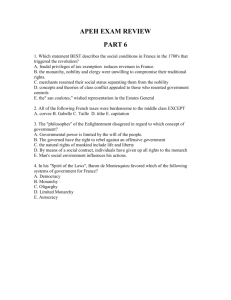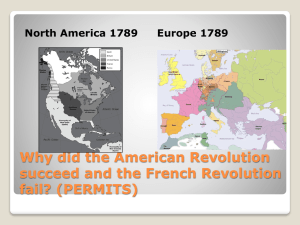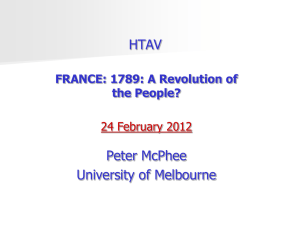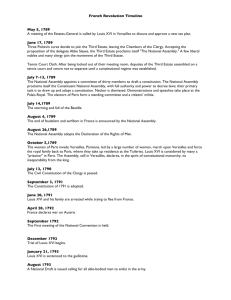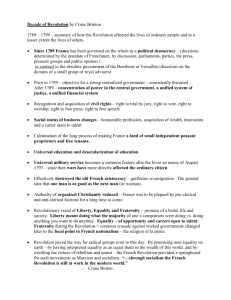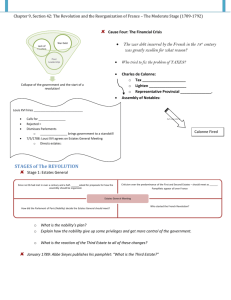Principal Dates and Time Line of the French Revolution 1789
advertisement
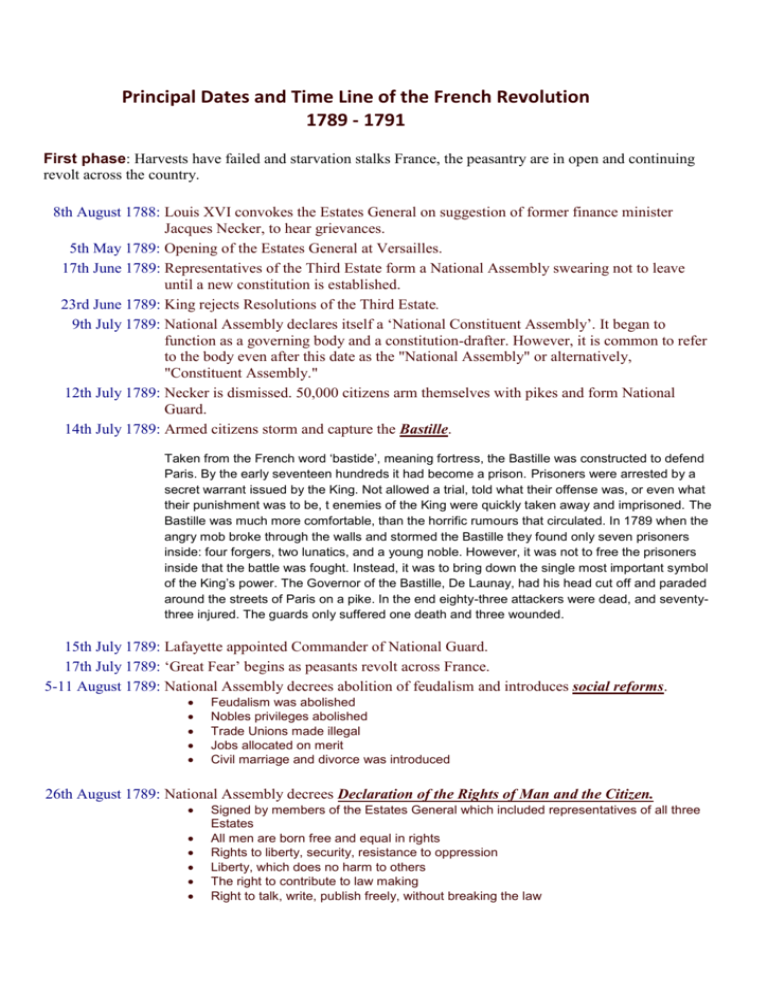
Principal Dates and Time Line of the French Revolution 1789 - 1791 First phase: Harvests have failed and starvation stalks France, the peasantry are in open and continuing revolt across the country. 8th August 1788: Louis XVI convokes the Estates General on suggestion of former finance minister Jacques Necker, to hear grievances. 5th May 1789: Opening of the Estates General at Versailles. 17th June 1789: Representatives of the Third Estate form a National Assembly swearing not to leave until a new constitution is established. 23rd June 1789: King rejects Resolutions of the Third Estate. 9th July 1789: National Assembly declares itself a ‘National Constituent Assembly’. It began to function as a governing body and a constitution-drafter. However, it is common to refer to the body even after this date as the "National Assembly" or alternatively, "Constituent Assembly." 12th July 1789: Necker is dismissed. 50,000 citizens arm themselves with pikes and form National Guard. 14th July 1789: Armed citizens storm and capture the Bastille. Taken from the French word ‘bastide’, meaning fortress, the Bastille was constructed to defend Paris. By the early seventeen hundreds it had become a prison. Prisoners were arrested by a secret warrant issued by the King. Not allowed a trial, told what their offense was, or even what their punishment was to be, t enemies of the King were quickly taken away and imprisoned. The Bastille was much more comfortable, than the horrific rumours that circulated. In 1789 when the angry mob broke through the walls and stormed the Bastille they found only seven prisoners inside: four forgers, two lunatics, and a young noble. However, it was not to free the prisoners inside that the battle was fought. Instead, it was to bring down the single most important symbol of the King’s power. The Governor of the Bastille, De Launay, had his head cut off and paraded around the streets of Paris on a pike. In the end eighty-three attackers were dead, and seventythree injured. The guards only suffered one death and three wounded. 15th July 1789: Lafayette appointed Commander of National Guard. 17th July 1789: ‘Great Fear’ begins as peasants revolt across France. 5-11 August 1789: National Assembly decrees abolition of feudalism and introduces social reforms. Feudalism was abolished Nobles privileges abolished Trade Unions made illegal Jobs allocated on merit Civil marriage and divorce was introduced 26th August 1789: National Assembly decrees Declaration of the Rights of Man and the Citizen. Signed by members of the Estates General which included representatives of all three Estates All men are born free and equal in rights Rights to liberty, security, resistance to oppression Liberty, which does no harm to others The right to contribute to law making Right to talk, write, publish freely, without breaking the law 5th October 1789: Women lead delegation to King in Versailles demanding bread. After scuffles, they are fobbed off by the King. 6th October 1789: King returns to Paris. 2nd November 1789: National Assembly decrees expropriation of Church. 16th December 1789: National Assembly legislates for departments, The old administrative areas of France were abolished They were replaced by 83 new departments The old dioceses were also abolished. The 83 new ones covered the same areas as the new departments and makes other Government Reforms. From 1791 an elected Legislative Assembly passed laws The Assembly was elected every 2 years Men who paid more than the minimum tax could be elected Men who paid tax were called Active Citizens Men who did not pay tax were called Passive Citizens King was called King of the French King could delay a law for 3 years People believed in democracy 19th June 1790: Abolition of nobility and titles. 14th July 1790: Civil Constitution, In 1790 the church was reorganised Priests elected and paid by the State Priests took an oath of loyalty to the State The tithe (church tax) was abolished Church lands were sold subordinating the Church to the civil government, inaugurated by Louis XVI. 30th January 1791: Mirabeau elected President of the French Assembly. 2nd March 1791: Abolition of Royal guilds and monopolies. New economic reforms. Customs barriers inside France abolished Same weights and measurements used inside France Church land income paid off France’s debts New taxes were based on ability to pay New paper currency, the assignat 21st June 1791: Louis XVI attempts to flee to Varennes but is recognised and forcibly returned to Paris. Read through the Timeline of events between 1789 and 1791. Write up more detail about the underlined sections. You can use the internet, or your textbook (Pgs 118 – 120) in order to do this.

